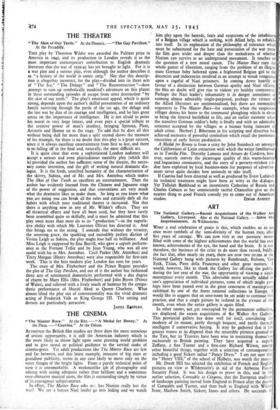"The Skin of Our Teeth." At the Phoenix.—"The Gay Pavilion."
At the Piccadilly.
THIS play by Thornton Wilder was awarded the Pulitzer prize in America in 1942, and its production in London reveals it as the most important contemporary contribution to English dramatic literature that she war of 5939-45 has yet brought to light. For it is a war play and a serious play, even although the author describes it as " a history of the world in comic strip." Not that this descrip- tion is altogether incorrect, for the play—divided into its three acts of " The Ice," " The Deluge " and " The Reconstruction "—does attempt to sum up symbolically mankind's adventure on this planet in three outstanding episodes of escape from utter destruction " by the skin of our teeth." The play's emotional appeal, which is quite strong, depends upon the author's skilful presentation of an ordinary family surviving through the perils of the ice age, the deluge and the last war by dint of its courage and intelligence, and he lays great stress on the importance of intelligence. He is not afraid to point his moral in very large letters, and even pays a special tribute to the creative power of man's intellect, bringing Spinoza, Plato, Aristotle and Homer on to the stage. To add that he does all this without being dull for more than a split second shows the measure
of his triumph, for there is no doubt that this play is a great success, since it is always excellent entertainment from first to last, and there is no falling off in the final and, naturally, the most difficult act.
It is quite clear that even a sophisticated London audience will accept a serious and even platitudinous morality play (which this is) provided the author has sufficient sense of the theatre, the neces- sary comic invention, and the gift of writing natural dramatic dia- logue. It is the -fresh, unstilted humanity of the characterisation of the skivvy, Sabina, and of Mr. and Mrs. Antrobus which makes The Skin of Our Teeth so excellent an entertainment, Then the author has evidently learned from the Chinese and Japanese stage of the power of suggestion, and that conventions are very much what the dramatist likes to make them. So long as you know what you are doing you can break all the rules and certainly defy all the habits with which your traditional theatre is incrusted. Not that there is anything new in any - of Mr. Wilder's effects. They are all theatrical effects and have all been used, but they have rarely been assembled quite so skilfully, and it must be admitted that this play owes more than most do to its " production "—to the superla- tive ability with which Mr. Laurence Olivier has directed it. And this brings me to the acting. I concede that without the vivacity, the unerring grace, the sparkling and incredibly perfect diction of Vivien Leigh as Sabina, the play might lose half its brilliance. And Miss Leigh is supported by Ena Burrill, who gave a superb perform- ance as the Fortune Teller...and by Joan Young, who was all one could wish for as Mrs. Antrobus. Cecil Parker (Mr. Antrobus) and Terry Morgan (Henry Antrobus) were also responsible for first-rate work. - This is the best modern play London has seen for years. The story of Mrs. Fitzherbert and the Prince Regent provides the plot of The Gay Pavilion, and out of it the author has fashioned three acts of sentimental domesticity performed with a due degree of charm by Mary Ellis (Mrs. Fitzherbert) and John Byron (Prince of. Wales), and relieved with a lively touch of humour by the sympa- thetic performance of Muriel Aked as Queen Charlotte. What almost lifted the play out of conventionality was the vivid dramatic acting of Frederick Valk as King George HI. The setting and dresses are particularly attractive.
JAMES ESDHERN.


























 Previous page
Previous page